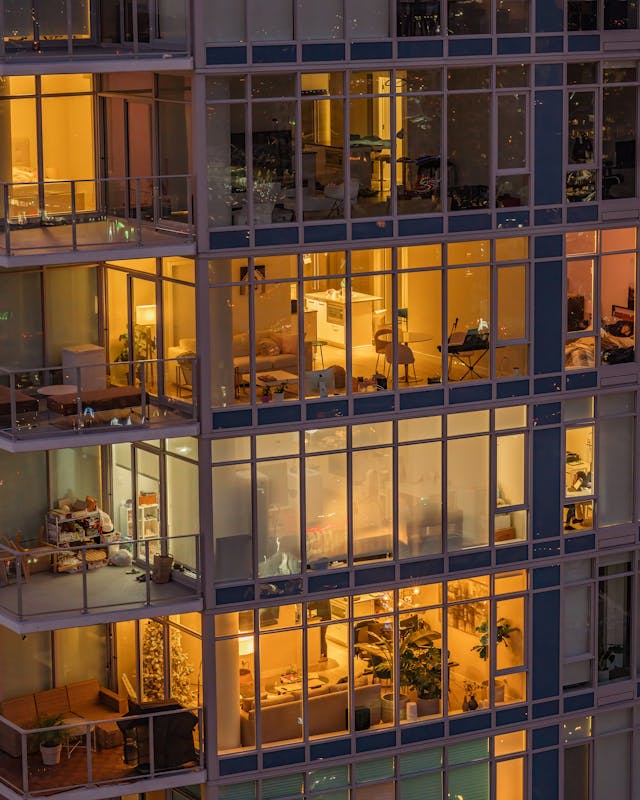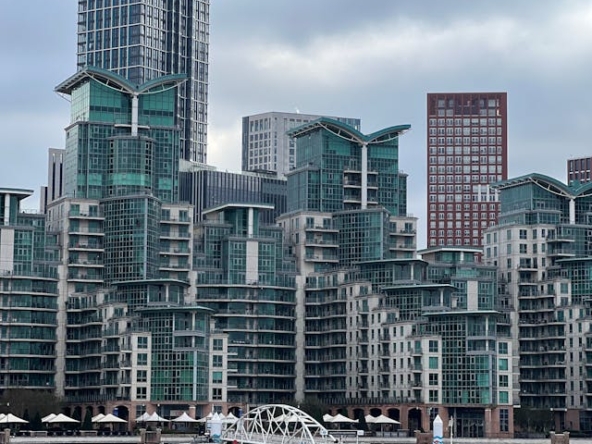Commercial lease agreements are legally binding contracts between property owners and business tenants. These documents outline the terms and conditions for renting commercial spaces, such as offices, retail stores, or industrial facilities.
In Winnipeg, Manitoba, understanding the nuances of commercial leases is crucial for both landlords and tenants to protect their interests and ensure a smooth business relationship.
Key Takeaways
- Commercial lease agreements are essential for renting business spaces in Winnipeg
- Key components include rent amount, lease duration, and maintenance responsibilities
- Winnipeg’s commercial real estate market influences lease terms and negotiations
- Local zoning laws and building codes impact commercial property use in Manitoba
- Legal advice is recommended for both landlords and tenants before signing a lease
- Negotiation is a critical part of the commercial leasing process in Winnipeg

Understanding the basics of commercial lease agreements
Commercial lease agreements in Winnipeg are more complex than residential leases. They often involve longer terms, higher financial stakes, and more detailed clauses. These contracts typically cover a wide range of issues, from rent payments and property maintenance to permitted uses of the space and options for renewal.
Types of commercial leases in Winnipeg
Winnipeg’s commercial real estate market offers several types of leases. The most common are gross leases, net leases, and percentage leases. In a gross lease, tenants pay a flat rate that covers rent and most operating expenses. Net leases require tenants to pay a base rent plus a portion of the property’s operating expenses. Percentage leases, often used for retail spaces, include a base rent plus a percentage of the tenant’s gross sales.
Key components of a commercial lease agreement
When reviewing a commercial lease agreement in Winnipeg, pay attention to these essential elements:
- Rent amount and payment schedule
- Lease term and renewal options
- Security deposit requirements
- Maintenance and repair responsibilities
- Permitted use of the property
- Insurance requirements
- Subletting and assignment rights
- Termination clauses
Winnipeg’s commercial real estate landscape
Winnipeg’s commercial real estate market has its own unique characteristics that influence lease agreements. The city’s diverse economy, ranging from manufacturing to technology sectors, creates demand for various types of commercial spaces.
Popular commercial areas in Winnipeg
Some of the most sought-after commercial areas in Winnipeg include:
- Downtown Winnipeg
- Exchange District
- St. James Industrial Area
- Polo Park
- Pembina Highway Corridor
These locations often command higher rents and may have specific zoning regulations that affect lease terms.

Market trends affecting commercial leases
Winnipeg’s commercial real estate market has seen fluctuations in recent years. Factors such as economic growth, changes in workforce patterns, and the rise of e-commerce have impacted demand for different types of commercial spaces. These trends can influence lease terms, rental rates, and the willingness of landlords to negotiate.
Legal considerations for commercial leases in Manitoba
Manitoba’s legal framework provides certain protections and obligations for both landlords and tenants in commercial lease agreements. It’s important to be aware of these legal aspects when negotiating or signing a lease.
Manitoba’s Commercial Tenancies Act
The Commercial Tenancies Act in Manitoba governs many aspects of commercial leases. This legislation outlines the rights and responsibilities of both parties, including rules for security deposits, lease terminations, and dispute resolution.
Zoning and land use regulations
Winnipeg’s zoning bylaws can significantly impact commercial leases. These regulations determine what types of businesses can operate in specific areas of the city. Before signing a lease, tenants should verify that their intended use of the property complies with local zoning laws.
Negotiating commercial lease terms in Winnipeg
Negotiation is a crucial part of the commercial leasing process in Winnipeg. Both landlords and tenants should be prepared to discuss and potentially modify various aspects of the lease agreement.
Common negotiation points
In Winnipeg’s commercial real estate market, these points are often up for negotiation:
- Rent amount and annual increases
- Length of the lease term
- Tenant improvement allowances
- Exclusivity clauses (for retail tenants)
- Early termination options
- Maintenance and repair responsibilities
Tips for successful negotiations
When negotiating a commercial lease in Winnipeg, consider these strategies:
- Research the local market to understand fair rental rates
- Clearly define your business needs and long-term goals
- Be prepared to compromise on some points to gain concessions on others
- Consider working with a local real estate agent or lawyer familiar with Winnipeg’s commercial market

Understanding rent structures in Winnipeg commercial leases
Rent is typically the most significant expense in a commercial lease. In Winnipeg, various rent structures are used, each with its implications for tenants and landlords.
Base rent vs. additional rent
Base rent is the minimum amount a tenant pays for occupying the space. Additional rent, often called “operating expenses” or “common area maintenance” (CAM) charges, covers the landlord’s costs for maintaining and operating the property.
Rent escalation clauses
Many commercial leases in Winnipeg include rent escalation clauses. These provisions allow for periodic rent increases, often tied to inflation or a fixed percentage. Understanding how these clauses work is crucial for budgeting and long-term financial planning.
Maintenance and repairs in commercial properties
Clearly defining maintenance and repair responsibilities is essential in a commercial lease agreement. In Winnipeg, where harsh winters can take a toll on buildings, this aspect is particularly important.
Landlord responsibilities
Typically, landlords are responsible for maintaining the building’s structure, roof, and major systems like heating and plumbing. However, the specifics can vary depending on the lease type and negotiations.
Tenant responsibilities
Tenants are often responsible for minor repairs and maintenance within their leased space. This might include tasks like changing light bulbs, cleaning, and basic upkeep of fixtures and appliances.
Insurance requirements for commercial tenants in Winnipeg
Insurance is a critical component of commercial lease agreements in Winnipeg. Both landlords and tenants need to understand their insurance obligations to protect their interests.
Types of insurance coverage
Commercial tenants in Winnipeg typically need several types of insurance:
- General liability insurance
- Property insurance
- Business interruption insurance
- Worker’s compensation insurance (if applicable)
Landlord insurance requirements
Landlords often require tenants to maintain specific insurance coverage and may ask to be named as an additional insured on the tenant’s policy. The lease agreement should clearly state these requirements.
Handling disputes in commercial lease agreements
Despite careful planning, disputes can arise in commercial leasing relationships. Understanding how to handle these situations is important for both landlords and tenants in Winnipeg.
Common sources of disputes
Frequent causes of disagreements in commercial leases include:
- Rent payment issues
- Maintenance and repair responsibilities
- Lease renewal terms
- Property damage
- Use of common areas
Dispute resolution methods
In Winnipeg, commercial lease disputes can be resolved through various methods:
- Negotiation between the parties
- Mediation with a neutral third party
- Arbitration (if specified in the lease agreement)
- Litigation in Manitoba courts (as a last resort)
Environmental considerations in Winnipeg commercial leases
Environmental issues are becoming increasingly important in commercial real estate. In Winnipeg, where industrial and commercial activities have a long history, these considerations can significantly impact lease agreements.
Environmental clauses in leases
Many commercial leases in Winnipeg now include environmental clauses. These provisions may address issues such as:
- Responsibility for environmental assessments
- Obligations to comply with environmental laws
- Liability for environmental contamination
- Requirements for Energy Efficiency and Sustainability
Winnipeg’s Green Building Initiatives
Winnipeg has been promoting green building practices, which can affect commercial leases. Some buildings may have specific environmental certifications (like LEED), which can impact operating costs and lease terms.

Technology and commercial leases in Winnipeg
As technology continues to shape business operations, it’s also influencing commercial lease agreements in Winnipeg.
Internet and telecommunications provisions
Modern businesses rely heavily on Internet and telecommunications services. Commercial leases should address:
- Access to high-speed internet
- Rights to install and maintain telecommunications equipment
- Responsibility for upgrades to technology infrastructure
Smart building features
Some commercial properties in Winnipeg are incorporating smart building technologies. Leases for these properties may include provisions related to:
- Building automation systems
- Energy management systems
- Access control and security systems
Termination and renewal of commercial leases
Understanding the processes for ending or extending a commercial lease is crucial for both landlords and tenants in Winnipeg.
Lease termination clauses
Commercial leases typically include specific conditions under which either party can terminate the agreement early. These might include:
- Breach of lease terms
- Bankruptcy or insolvency
- Damage to the property
- Redevelopment plans
Renewal options
Many commercial leases in Winnipeg include options for renewal. These clauses specify:
- How many renewal terms are available
- The process for exercising renewal options
- How rent will be determined for renewal periods
Impact of COVID-19 on commercial leases in Winnipeg
The COVID-19 pandemic has significantly affected commercial real estate in Winnipeg, leading to changes in lease agreements and negotiations.
Force majeure clauses
The pandemic has highlighted the importance of force majeure clauses in commercial leases. These provisions address unforeseen circumstances that prevent parties from fulfilling their contractual obligations.
Adapting to new business realities
Commercial leases in Winnipeg are evolving to address new business needs, such as:
- Flexible space arrangements
- Enhanced cleaning and sanitization protocols
- Provisions for remote work and reduced occupancy
Sources
- According to a study by the National Real Estate Investment & Trade Association (NAREIT), the average duration of a commercial lease agreement is 6.6 years. Longer lease terms can provide stability for both landlords and tenants. (Source)
- Another effective strategy for commercial lease agreements is flexible lease terms. Flexible leases can allow tenants to expand or contract their space as their business grows. This flexibility can be particularly important in industries with rapidly changing market conditions. (Source)
- A triple net lease is a common type of commercial lease agreement where the tenant is responsible for paying property taxes, insurance, and maintenance costs in addition to rent. According to a report by LoopNet, 62% of commercial properties listed for lease in the US were listed as triple net leases. (Source)
- Negotiating rent concessions can also be an effective strategy for commercial lease agreements. Rent concessions can include discounts on rent, free rent periods, or tenant improvement allowances. According to a report by Cushman & Wakefield, 45% of landlords offered rent concessions in Q1 2021. (Source)
Navigating commercial leases in Winnipeg
Commercial lease agreements in Winnipeg are complex documents that require careful consideration. Understanding the local market, legal requirements, and potential negotiation points is essential for both landlords and tenants. By thoroughly reviewing lease terms, seeking professional advice when needed, and staying informed about market trends, businesses can secure favorable lease agreements that support their operations and growth in Winnipeg’s dynamic commercial real estate landscape.
| Aspect | Gross Lease | Net Lease | Percentage Lease |
|---|---|---|---|
| Rent Structure | The flat rate covers most expenses | Base rent plus a share of operating expenses | Base rent plus a percentage of gross sales |
| Tenant Responsibility | Limited additional costs | Pays a portion of property expenses | Pays base rent and percentage of sales |
| Landlord Responsibility | Covers most property expenses | Manages property, bills tenant for share | Maintains property, monitors tenant sales |
| Typical Use | Office spaces | Retail, Industrial | Retail spaces |
| Risk Distribution | Lower risk for the tenant | Shared risk | Higher risk for tenant |
| Commercial Area | Primary Industries | Average Lease Rates (per sq ft/year) | Vacancy Rate |
|---|---|---|---|
| Downtown Winnipeg | Finance, Government | $18 – $25 | 12% |
| Exchange District | Creative, Tech | $14 – $20 | 8% |
| St. James Industrial | Manufacturing, Warehousing | $8 – $12 | 5% |
| Polo Park | Retail | $25 – $35 | 7% |
| Pembina Highway | Mixed Commercial | $15 – $22 | 10% |
- Research local market rates and trends
- Clearly define your business needs and growth plans
- Seek professional advice from a real estate lawyer or agent
- Be prepared to negotiate key terms like rent, duration, and maintenance responsibilities
- Review and understand all clauses, especially those related to termination and renewal
- Consider the impact of zoning laws and environmental regulations on your business operations
- Ensure the lease allows for necessary technology installations and upgrades
- Understand your insurance obligations and coverage requirements
- Plan for potential disputes by reviewing dispute resolution clauses
- Stay informed about economic factors that could affect your lease in the long term



